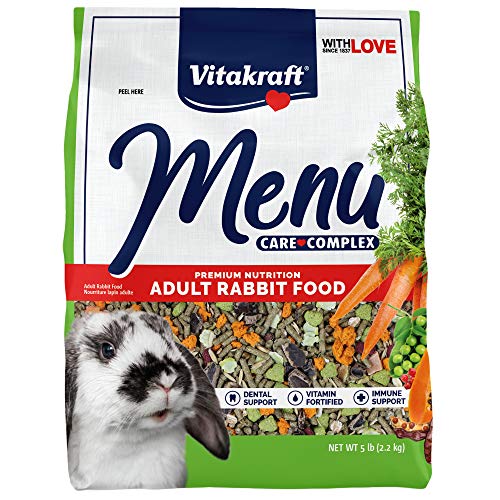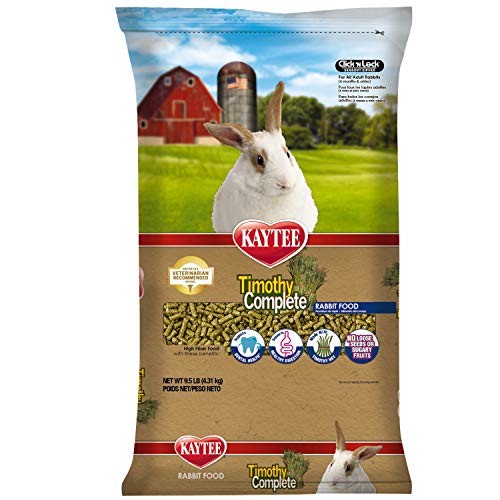NickZac
Well-Known Member
Hello...please forgive me for the length as this will be my first post. I am Zac and I own Lilly, a Netherlands short haired dwarf. She is about 2 years old and 5.5 to 6 pounds and overall body structure is a classic dwarf, with not all that fat nor skinny, but well filled out as house rabbits are opposed to wild rabbits. She lives in my house, and while she has a cage, the only time she is in it is to eat or excrete, and otherwise is usually sleeping in my bed or with my Maltese, Beau, who is her BFF. My room in which she is left alone to free roam is rabbit proofed, and the rabbit has also been house proofed. Her diet is a combo of Timothy Hay (certified natural/pesticide free when I can find it), locally grown and/or organic Romaine Lettuce, Spinach, Carrots, (very little) Celery (for the hi-de fiber and its help on the GI tract), and Sunaturals Natural Rabbit Food (in the purple/gray bag). Her water comes from a ceramic bowl, after I noted how much bacteria would multiply in a bottle, which I stopped using 6 months ago+/-. The bedding used for her cage and litterbox is Carefresh Ultra, and her litterbox is serviced a few times through the day and outright changed as needed, usually every day or so. She gets brushed daily with a light wire comb, and her hair is neither short nor long, and is easy to work with and groom. I cut her nails myself with a specialized trimmer, as she will lay on the floor and let me cut them, which seems to beat the stress of having someone else do it. Her teeth have never needed filing or trimming, as they wear evenly from a variety of things to chew on. Intelligence wise, Lilly is smarter than my dog, Beau, and has shown an extensive problem solving IQ that includes adjustment to artificially introduced 'stimulants'...which is almost scary. Friend wise, she plays with my dog daily, and is also good friends with our next door hunting dog (which is in itself amusing as the dog LOOOOVES her). Behavior wise, she is like a small horse, and has lost most of the 'stereotypical rabbit behavior', as she is unphased by new people, animals, and loves being picked up. When she sees another living animal, she hops towards it thinking that it is playtime.
So her sheds, like some other rabbits, are weird as she loses clumps exposing skin in bizzare patterns. This year for the Spring shed she lost a lot of hair on her bottom exposing pink skin. Given she loves to binky and play with the dog, this patch got irritated quickly, to the point of it becoming an open wound, much like run burn. Because their skin is so sensitive, I tried to wait it out and see if it would heal on its own for a few days, but it only got worse. At that point, I made an appointment with my vet and started cleaning it with Provon soap (best stuff ever for anyone with sensitivites), and topically treating it with a Benzethonium Chloride topical in an aloe vera base, in addition to a light amount of hydrocortisone. In the 2 days of doing this, it got a lot better than it was. At the vet, they did a swab for a few common skin parasites and did a biopsy and bacterial swab and I presume a stain. They indicated a small amount of bacteria was present, which as you probably know does not mean an infection as we always have bacteria on our skin and all wounds will have some bacteria in them. He said to do 10 days of Baytril and a probiotic.
Over the next 2 days I continued the topical treatment and began the antibiotic and the sores continued to heal, even the much more extensive ones used for the biopsy at the vet. She decreased the amount she was eating over the past 12 hours (but is still eating decently well). Today I noticed her fecal pellets are drastically fewer, drastically smaller, and much dryer than they normally are, and this has me extremely alarmed. This is NOT from hair as I brush this rabbit religiously and use the 'wet hand' method, and she does not overgroom. Also, as it was the weekend, bunny has been with me for most of the day and night.
I am very familiar with human antibiotics but not animal ones. I checked up on Baytril, and was alarmed to find that it is enrofloxacin, which is chemically similar to Cipro (ciprofloxacin, but everyone calls it by the actual brand name), as it is a Fluoroquinolone, which is without a doubt the most dangerous class of antibiotics that humans use today. I am also upset, and almost irate, that I was not told that this medication type was being administered to my rabbit, who is in all respects a member of my family. Cipro is a potentially dangerous (and blackboxed) antibiotic, and alternatives that have fewer side effects exists. It's advantages to another wide-spec antibiotics, called doxycycline are few. The big side effects of the Fluoroquinolone for humans include: (common) tendon rupture, long term health decline, and even death. While this can occur with any medication, Fluoroquinolones are much more likelier to produce severe to life-threatening adverse reactions. Doxycycline has a much lesser side effect profile, wide-spectrum activity, and costs far less to produce than Cipro. Doxy is well tested in dogs, birds, and fish, and has been used on rabbits in clinical studies without issue and has shown effectiveness and safety...with that said I do not know how doxy works with 'pets' as these studies were animal-based research for human relevance. My question is, can enrofloxacin cause GI slowdowns in rabbits to a dangerous level? It has not been unheard of for Fluoroquinolones to greatly slow gastric emptying in people; can this occur in rabbits? Dehydration is also another potential issue, although I would have to assume less so in rabbits as they cannot vomit in the sense that other animals can.
Furthermore, if her GI tract is continuing to be slow at this level, what should be done? For a person, one of the first-line treatments is Reglan (metoclopramide), and I am aware that it has had extensive use in smaller mammals, including rabbits, for the purpose of gut stimulation. Even people have more GI problems when exposed to stress, and at this point, I am weary about taking her anywhere, including the vet, as it could make things worse than better. At this point, I want to do something before her GI tract stops fully, which is a whole nightmare of its own.
Finally, would the correct dosing of Reglan be about 1-1.5 mg for a 5.5-6lb rabbit? What are other potential antibiotics and their dosings that could be switched to? Would you just discontinue the antibiotic outright since the wounds it was prescribed to treat are healing well? Thank you so much in advance!
So her sheds, like some other rabbits, are weird as she loses clumps exposing skin in bizzare patterns. This year for the Spring shed she lost a lot of hair on her bottom exposing pink skin. Given she loves to binky and play with the dog, this patch got irritated quickly, to the point of it becoming an open wound, much like run burn. Because their skin is so sensitive, I tried to wait it out and see if it would heal on its own for a few days, but it only got worse. At that point, I made an appointment with my vet and started cleaning it with Provon soap (best stuff ever for anyone with sensitivites), and topically treating it with a Benzethonium Chloride topical in an aloe vera base, in addition to a light amount of hydrocortisone. In the 2 days of doing this, it got a lot better than it was. At the vet, they did a swab for a few common skin parasites and did a biopsy and bacterial swab and I presume a stain. They indicated a small amount of bacteria was present, which as you probably know does not mean an infection as we always have bacteria on our skin and all wounds will have some bacteria in them. He said to do 10 days of Baytril and a probiotic.
Over the next 2 days I continued the topical treatment and began the antibiotic and the sores continued to heal, even the much more extensive ones used for the biopsy at the vet. She decreased the amount she was eating over the past 12 hours (but is still eating decently well). Today I noticed her fecal pellets are drastically fewer, drastically smaller, and much dryer than they normally are, and this has me extremely alarmed. This is NOT from hair as I brush this rabbit religiously and use the 'wet hand' method, and she does not overgroom. Also, as it was the weekend, bunny has been with me for most of the day and night.
I am very familiar with human antibiotics but not animal ones. I checked up on Baytril, and was alarmed to find that it is enrofloxacin, which is chemically similar to Cipro (ciprofloxacin, but everyone calls it by the actual brand name), as it is a Fluoroquinolone, which is without a doubt the most dangerous class of antibiotics that humans use today. I am also upset, and almost irate, that I was not told that this medication type was being administered to my rabbit, who is in all respects a member of my family. Cipro is a potentially dangerous (and blackboxed) antibiotic, and alternatives that have fewer side effects exists. It's advantages to another wide-spec antibiotics, called doxycycline are few. The big side effects of the Fluoroquinolone for humans include: (common) tendon rupture, long term health decline, and even death. While this can occur with any medication, Fluoroquinolones are much more likelier to produce severe to life-threatening adverse reactions. Doxycycline has a much lesser side effect profile, wide-spectrum activity, and costs far less to produce than Cipro. Doxy is well tested in dogs, birds, and fish, and has been used on rabbits in clinical studies without issue and has shown effectiveness and safety...with that said I do not know how doxy works with 'pets' as these studies were animal-based research for human relevance. My question is, can enrofloxacin cause GI slowdowns in rabbits to a dangerous level? It has not been unheard of for Fluoroquinolones to greatly slow gastric emptying in people; can this occur in rabbits? Dehydration is also another potential issue, although I would have to assume less so in rabbits as they cannot vomit in the sense that other animals can.
Furthermore, if her GI tract is continuing to be slow at this level, what should be done? For a person, one of the first-line treatments is Reglan (metoclopramide), and I am aware that it has had extensive use in smaller mammals, including rabbits, for the purpose of gut stimulation. Even people have more GI problems when exposed to stress, and at this point, I am weary about taking her anywhere, including the vet, as it could make things worse than better. At this point, I want to do something before her GI tract stops fully, which is a whole nightmare of its own.
Finally, would the correct dosing of Reglan be about 1-1.5 mg for a 5.5-6lb rabbit? What are other potential antibiotics and their dosings that could be switched to? Would you just discontinue the antibiotic outright since the wounds it was prescribed to treat are healing well? Thank you so much in advance!









































































